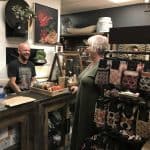Starting a business is risky.
Data the U.S. Census Bureau has gathered show maybe 20 percent of businesses do not last through the first year, and 70 to 80 percent will not be around five years after starting.
While that information may be depressing and suggest you not even try, you have ways to increase your odds of success.
First and foremost for the small-business owner is recognizing those odds and what they mean. Many business owners do not put a lot of time and energy into thinking about the business before ever opening the doors. Starting a business is more than finding a location, getting your business cards and ordering merchandise.
It also is more than just assuming people will find you – the myth of build it and they will come.
Studies of businesses that have succeeded and those that have not survived provide some insight into several additional factors that can increase your chances of being around long after the five-year window has passed.
One important factor is prior work experience. In Kauffman Foundation interviews with founders of successful businesses, 98 percent of those surveyed said that prior work experience was crucial. Work in a related-business field seems to offer even more insight, but some evidence indicates that work in an entirely different area can be highly beneficial if you can stretch and see how you can bring other ideas into a new situation.
A second crucial factor was the formation of networks. The information you need often is held by someone who already has “been there and done that.” You don’t need to know the information if your network provides you with the person who can offer direct experience..
Strongly tied to the idea of networks is the need for a mentor, an often found factor of success. While your network acts as a link to information and contacts, your mentor helps you dig into the deeper questions and also may take the opposing view in your discussions.
Other factors can make a difference as well. These include:
- Having good physical and mental health.
- Being prepared to put in the time and effort required – You are not quitting the 40-hour-per-week job to lie by the pool. Plan on spending 80 hours a week running your business.
- Starting with sufficient capital – Know that no free money is available. Initial capital typically comes from your savings and personal loans.
- Having a plan for the business and for your marketing – That plan should be written with some anticipated measures of success so you can ensure you stay on track.
- Knowing what your cash flow needs will be and when additional capital might be required – This is the type of question your plan should address.
- Identifying what you don’t know – Then you can plan where to get those skills, management, people, accounting, legal, marketing, etc., or where you can get help
- Knowing the market you will be in, as well as the industry, and understanding who your competitors are.
One final key in developing a successful business is ensuring that your family is on board with you in this goal. Developing a business takes family financial resources. It also will eat into family time and may very well require family members’ involvement in the business. This changes family interactions and relationships.
Starting a business is a risk, but you can better your odds. Every step you take ahead of time might be one that your competition didn’t work on, giving you the advantage.
This article is cited in the following:
Book: Go-to-Market Strategies for Women Entrepreneurs, Emerald Publishing Limited, Bingley, pp. 195-205. https://doi.org/10.1108/978-1-78973-289-420191024
- About the Author
- Latest by this Author
Glenn Muske is an independent expert on rural small business, working as GM Consulting – Your partner in achieving small business success. He provides consulting, and writes articles for county extension agents and newspapers across North Dakota. Previously, he was the Rural and Agribusiness Enterprise Development Specialist at the North Dakota State University Extension Service – Center for Community Vitality.











